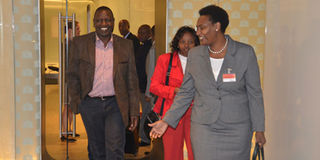ICC judges allow Ruto to attend only key sessions

Deputy President William Ruto (left) and his wife Rachel Ruto are received by Kenyan ambassador to The Netherlands Makena Muchiri (right) at the Schipol Airport May 13, 2013. Mr Ruto was in The Hague to attend ICC's status conference May 14, 2013. Mr Ruto will attend key sessions of his trial at the International Criminal Court, judges ruled June 18, 2013. FILE
What you need to know:
Mr Ruto must be physically present in the courtroom for the following hearings:
i. the entirety of the opening statements of all parties and participants,
ii. the entirety of the closing statements of all parties and participants,
iii. when victims present their views and concerns in person,
iv. the entirety of the delivery of judgment in the case,
V. the entirety of the sentencing hearings (if applicable),
vi. the entirety of the sentencing (if applicable),
vii. the entirety of the victim impact hearings (if applicable),
viii. the entirety of the reparation hearings (if applicable), and
ix. any other attendance directed by the Chamber;
The Chamber rules that Ruto's position as Deputy President does not grant him immunity from standing trial at The Hague.
- Judge Olga Herrera Carbuccia appends a dissenting opinion.
Mr Ruto's trial is set to open on September 10.
Deputy President William Ruto will attend key sessions of his trial at the International Criminal Court.
However, the Trial Chamber V excused Mr Ruto from other court sessions citing his state duties as Deputy President.
The Chamber ruled that his position will not grant him immunity from standing trial at The Hague. It also dismissed Mr Ruto’s request to be allowed to attend his trial through video-link.
“The Chamber recalled that the Rome Statute does not afford any immunity based on official capacity. The Chamber stressed that permission granted Mr Ruto to not be continuously present was strictly for purposes of accommodating the demanding functions of his office as Deputy Head of State of Kenya and not merely to gratify the dignity of his own occupation of that office,” a court statement said Tuesday.
The Chamber, by majority, ruled that Mr Ruto will be required to be present for the opening and closing statements of all parties. The Deputy President will also be required to be present at The Hague when the victims present their views and when the court delivers its judgment.
“Today, 18 June 2013, Trial Chamber V (A) of the International Criminal Court (ICC) conditionally granted, by majority, the request of William Samoei Ruto to be excused from being physically present continuously throughout the trial, scheduled to start on 10 September 2013,” statement from the ICC said.
“He is also required to be present during the delivery of judgment in the case and, if applicable, sentencing and reparations and any other attendance that may be ordered by the Chamber,” the ruling by the ICC judges said.
However, the Trial chamber judges warned that they could still revoke the reprieve if the accused fails to adhere to the instructions that accompany the conditional excuse from The Hague.
“The Trial Chamber retains judicial control over the accused during the entirety of the proceedings and violations of any of these conditions may result in the revocation of the excusal and/or the issuance of an arrest warrant as appropriate,” the judges, by majority ruled, according to the statement.
The judges also directed the Deputy President to undertake, in his personal capacity, that there will no instances of witnesses and victims tampering, “including by calling on his supporters to refrain from creating any intimidating or harassing atmosphere for these persons involved with the ICC".
Observe obligations
The judges ruled that Mr Ruto must observe the obligations in the March 8, 2011 summons to appear. The obligations, among others, require the accused not to contact directly or indirectly any person who is or is believed to be a victim or a witness of the alleged crimes. The accused is also required to refrain from corruptly influencing or interfering with a witness’s testimony.
Judge Olga Herrera Carbuccia appended a dissenting opinion from that of Judges Chile Eboe-Osuji and Robert Fremr.
The judge said it would be wrong for Mr Ruto to be excused from trial based on his status.
"The Chamber has the duty to ensure that all accused are treated fairly and impartially. Pursuant to Article 21(3) of the Statute, all accused must be treated equally, without making any adverse distinction founded on grounds such as gender, age, race, colour, language, religion or belief, political or other opinion, national, ethnic or social origin, wealth birth or other status," said the judge.
"Moreover, the first sentence of Article 27 of the Statute clearly states that the "Statute shall apply equally to all persons without any [favourable or unfavourable] distinction based on official capacity".
"Article 63(1) of the Statute mandates that the "accused shall be present at trial". Read jointly, these two provisions dictate that all accused persons shall be present at trial, regardless of their official capacity. Pursuant to the above Statutory provisions, as well as internationally recognised human rights, all persons shall be equal before courts and tribunals and no accused should be accorded privileged treatment, as equality under the law is a fundamental value of the administration of justice.
"Mr Ruto should not be given a different legal status on the basis of his personal position as Deputy President of the Republic of Kenya," the judge said.
Mr Ruto's trial is set to open on September 10.
The Deputy President and his co-accused Joshua Sang face charges of crimes against humanity of murder, deportation or forcible transfer of populations and persecution, allegedly committed during the post-election violence in Kenya in 2007 and 2008.




